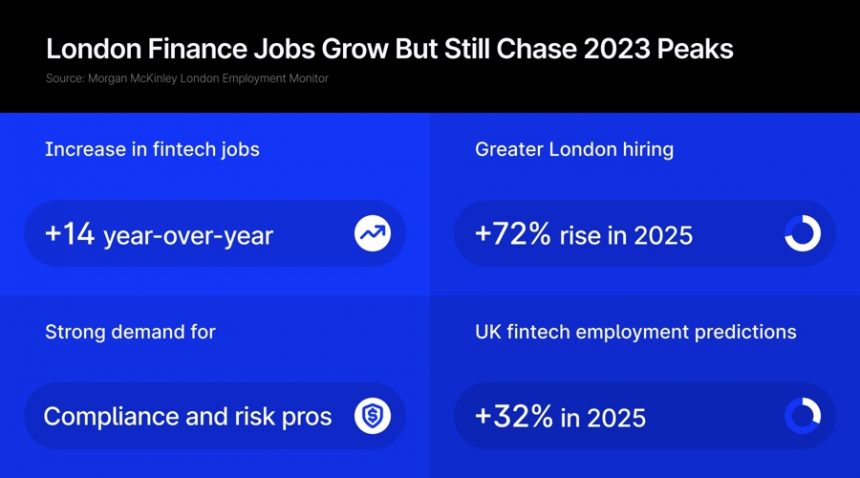Financial services and fintech job openings in London climbed 14% compared to the same period last year, according to new data from recruitment firm Morgan McKinley, though hiring levels remain below their 2023 highs.
London Finance Jobs Rise 14% as Fintech Drives Hiring Recovery
The firm’s latest employment monitor found job vacancies rose 3% in the second quarter compared to the first quarter of 2025. The figures suggest London’s finance sector continues recovering from last year’s downturn, but the pace remains measured.
Fintech companies are leading the charge, with compliance and risk roles seeing particularly strong demand. Morgan McKinley projects Greater London will see a 72% jump in fintech hiring throughout 2025, making it the UK’s fastest-growing sector for recruitment.
“The latest figures from our London Employment Monitor points to a continued rebound in London’s financial services hiring,” said Mark Astbury, director at Morgan McKinley. “Following a 12% seasonal bounce in Q1, we’ve seen a further 3% increase this quarter and a 14% year-on-year uplift.”
Mark Astbury, director at Morgan McKinley
What’s Holding Back a Stronger Jump?
But Astbury cautioned that several factors are holding back stronger growth. Global market volatility , Middle East tensions, and uncertainty around US trade policies have dampened momentum since the year began with renewed optimism.
The UK government’s decision to raise employer National Insurance contributions has also weighed on business confidence, according to the recruitment firm. Many companies remain cautious about expanding their workforce amid ongoing cost-cutting pressures and economic uncertainty.
Contract Market Cools as Firms Favor Permanent Staff
While permanent hiring held steady with a 3% quarterly increase, the contract market has softened since Easter. Companies are prioritizing stable, full-time teams over temporary coverage as they focus on long-term efficiency rather than short-term headcount growth.
“From what I’m seeing on the ground, interim recruitment has been subdued with firms prioritising stable, permanent teams in core business areas over short-term cover,” Astbury said.
Artificial intelligence and automation are pushing companies to streamline operations and reduce their reliance on traditional entry-level positions. Investment is increasingly flowing toward technology upgrades and operational improvements.
Industry Awaits Chancellor’s Speech
The finance sector is closely watching Chancellor’s upcoming Mansion House speech on July 15 for concrete measures that could boost business confidence and hiring demand. Industry observers expect the speech to focus on economic growth and the future of the City of London.
Potential initiatives could include unlocking pension capital for investment in UK businesses and improving financial services competitiveness, though the industry wants to see specific, actionable policies rather than broad ambitions.
“While these ambitions are welcome, the industry is hoping for clear, actionable measures that translate into real-world hiring and business confidence,” Astbury said. “Despite ongoing headwinds, employers that remain agile and deliberate in their planning will be best placed to adapt, navigate and grow in this evolving market.”
The data comes from Morgan McKinley’s quarterly London Employment Monitor, which tracks job vacancy trends across the capital’s financial services sector.
Financial services and fintech job openings in London climbed 14% compared to the same period last year, according to new data from recruitment firm Morgan McKinley, though hiring levels remain below their 2023 highs.
London Finance Jobs Rise 14% as Fintech Drives Hiring Recovery
The firm’s latest employment monitor found job vacancies rose 3% in the second quarter compared to the first quarter of 2025. The figures suggest London’s finance sector continues recovering from last year’s downturn, but the pace remains measured.
Fintech companies are leading the charge, with compliance and risk roles seeing particularly strong demand. Morgan McKinley projects Greater London will see a 72% jump in fintech hiring throughout 2025, making it the UK’s fastest-growing sector for recruitment.
“The latest figures from our London Employment Monitor points to a continued rebound in London’s financial services hiring,” said Mark Astbury, director at Morgan McKinley. “Following a 12% seasonal bounce in Q1, we’ve seen a further 3% increase this quarter and a 14% year-on-year uplift.”
Mark Astbury, director at Morgan McKinley
What’s Holding Back a Stronger Jump?
But Astbury cautioned that several factors are holding back stronger growth. Global market volatility , Middle East tensions, and uncertainty around US trade policies have dampened momentum since the year began with renewed optimism.
The UK government’s decision to raise employer National Insurance contributions has also weighed on business confidence, according to the recruitment firm. Many companies remain cautious about expanding their workforce amid ongoing cost-cutting pressures and economic uncertainty.
Contract Market Cools as Firms Favor Permanent Staff
While permanent hiring held steady with a 3% quarterly increase, the contract market has softened since Easter. Companies are prioritizing stable, full-time teams over temporary coverage as they focus on long-term efficiency rather than short-term headcount growth.
“From what I’m seeing on the ground, interim recruitment has been subdued with firms prioritising stable, permanent teams in core business areas over short-term cover,” Astbury said.
Artificial intelligence and automation are pushing companies to streamline operations and reduce their reliance on traditional entry-level positions. Investment is increasingly flowing toward technology upgrades and operational improvements.
Industry Awaits Chancellor’s Speech
The finance sector is closely watching Chancellor’s upcoming Mansion House speech on July 15 for concrete measures that could boost business confidence and hiring demand. Industry observers expect the speech to focus on economic growth and the future of the City of London.
Potential initiatives could include unlocking pension capital for investment in UK businesses and improving financial services competitiveness, though the industry wants to see specific, actionable policies rather than broad ambitions.
“While these ambitions are welcome, the industry is hoping for clear, actionable measures that translate into real-world hiring and business confidence,” Astbury said. “Despite ongoing headwinds, employers that remain agile and deliberate in their planning will be best placed to adapt, navigate and grow in this evolving market.”
The data comes from Morgan McKinley’s quarterly London Employment Monitor, which tracks job vacancy trends across the capital’s financial services sector.




![how-do-millionaires-make-their-money?-[2024-irs-data]](https://inboxguruinsights.com/wp-content/uploads/2024/08/3554-how-do-millionaires-make-their-money-2024-irs-data-420x280.jpg)


